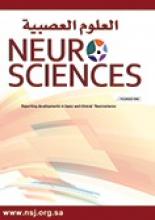Abstract
OBJECTIVE: To investigate the presence of IgG and IgM types of anticardiolipin (aCL) and antiphospholipid (aPL) antibodies in younger Iranian patients with ischemic stroke.
METHODS: Both IgG and IgM types of aPL (cardiolipin, anti phosphatidyl inositol, anti phosphatidyl serine, anti phosphatidic acid and beta 2-glycoprotein I [B2-GPI]) and aCL alone (cardiolipin and B2-GPI) were measured in 117 patients with ischemic stroke (aged <45 years) during an 18-month period from September 2002 to March 2004 in Al-Zahra Hospital, Isfahan, Iran. The demographic, clinical, and laboratory characteristics of patients with a positive titer were recorded.
RESULTS: Seven men and 16 women (23 patients, 19.6%) had increased IgG types of aPL antibodies. Increased titers of IgM and IgG were found in 19 (82.6%) and 6 (26%) patients for aPL antibodies and in 15 (83.3%) and 8 (44.4%) cases for aCL alone.
CONCLUSION: Despite European studies, high titers of IgM aPL antibodies found in a large number of patients can be caused by the presence of unknown triggering factors (infections or poisons), that are more prevalent in developing countries compared to developed countries. This hypothesis remains to be investigated further.
- Copyright: © Neurosciences
Neurosciences is an Open Access journal and articles published are distributed under the terms of the Creative Commons Attribution-NonCommercial License (CC BY-NC). Readers may copy, distribute, and display the work for non-commercial purposes with the proper citation of the original work.






